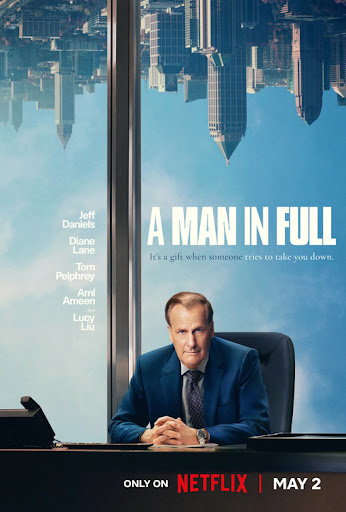One of my very favorite television genres is Jeff Daniels conducting business while chewing scenery. Whether playing a news anchor in "The Newsroom" or a detective in "American Rust," he always carries himself with such studious charisma. David E. Kelley's "A Man in Full" presents Daniels with a new challenge, tapping into his inner Colonel Sanders meets Logan Roy as Charlie Croker, an Atlanta real-estate mogul with a broken bank account. However, despite the efforts of Daniels and a few other performers, "A Man in Full" is a rather middling miniseries. Even direction from luminaries like Regina King and Thomas Schlamme isn't enough to save this ho-hum social class drama.
Based on Tom Wolfe's 1998 novel of the same name but translated into the 21st century, "A Man in Full" focuses on the Southern-fried Croker (Daniels), who lives lavishly like every other wealthy business tycoon, real or fictional: He flies around in private jets, has a much younger wife (Sarah Jones), and, most importantly, bleeds money like the bank isn't coming to get him. On the heels of his ostentatious 60th birthday party, where his closest aristocratic business friends gather to watch none other than Shania Twain (a wild cameo) perform some of her greatest hits, the bank comes a-knocking, wanting their loan money back—$800 million worth, in fact.
Shortly after the festivities, Croker meets with Planners Bank; his opponent, Harry Zale (a fierce Bill Camp), squeezes him out, telling him he's bankrupt and must start paying back what he owes. Within that boardroom is his old prodigy-turned-loan-officer Raymond Peepgrass (an engrossing Tom Pelphrey)—a real name nobody decided to update for some reason––who has it out for Croker. As his troubles compound, Croker scrambles to find investors for his monolithic business.
Croker's woes play out amidst a mayoral election season, in which his former business colleague runs against Wes Jordan (William Jackson Harper), a young Black mayor vying for his second term. Right when Croker needs his corporate attorney Roger White (Aml Ameen) at his side, he instead tasks him to help his secretary, Jill Hensley (Chanté Adams), with a racially-charged trial involving her peacekeeping husband Conrad (Jon Michael Hill), convicted of assaulting a violent police officer over a parking violation that lands him in at a hostile correctional facility.
I went into "A Man in Full" thinking it would fill the "Succession"-level void I've been yearning for since its conclusion. Alas, it's nowhere close to that. Thematically, it plays like a Georgia-set "House of Cards" meets "The Chi," as Kelley's roundabout dissection of the working- and upper-class disparity within Atlanta isn't anything particularly novel or interesting. Kelley fills the proceedings with a few comical moments that were, per my research, adapted from Wolfe's text—like Croker trying to show an investor horse breeding on his plantation. But these cheekier moments never cohesively tie into the distressing depiction of the American judicial system and the Black male experience that remains far too close to reality.
Kelley's navigation through these social issues suffers from a dizzying overabundance of characters, many of whom are ultimately too uninteresting and rote for a tale far too true to life. While he pours his signature dramatic flair into his character writing, he conjoins too many relevant, timely themes with moments of surrealism, blurring the vision.
Considering "A Man in Full"'s novel is so closely tied to 1990s politics—specifically the collision of old-fashioned (white) agrarian values with the growing recognition of anti-Blackness in the justice system—the series does its darndest to translate those social issues to the modern day. However, Kelley treats his characters with perplexing shortcuts in the process, flattening such complex issues into a surface-level take on haves versus have-nots. The writing asks you to immediately invest in its characters as if you've been following them for years; every conversation assumes we know the ingrain of every party's relationship with each other. It's unclear how Croker relates to the people in his orbit, which makes the always-heightened conflict ring false.
Ameen serves as the miniseries' strongest bridge, giving an engaging, passionate performance as the only thoroughly interesting character. What starts as a favor to Croker snowballs into something more as the challenges of Conrad's case force him to lean into a criminal justice lawyer and pour his passion into getting Conrad out of the system. The episodes that lean into those aspects, directed by King, are done with such grounded realism that it makes all the money-related threads feel monotonous by comparison. These interested me more than, say, the show's many subplots, like the mayor's re-election campaign or Peepgrass' sly rise to seize Croker's power and the pathetic aspects of his small life.
At the end of the day, for such a marquee series with a massive star like Daniels, there's little Daniels to actually enjoy. His thick Southern drawl drips with conviction, and it's hard to turn away from his irresistible charisma. Unfortunately, he's a small speck in this wider portrait of Atlanta that, while evergreen, rarely feels all that full in itself.
Whole series screened for review. Now on Netflix.




















